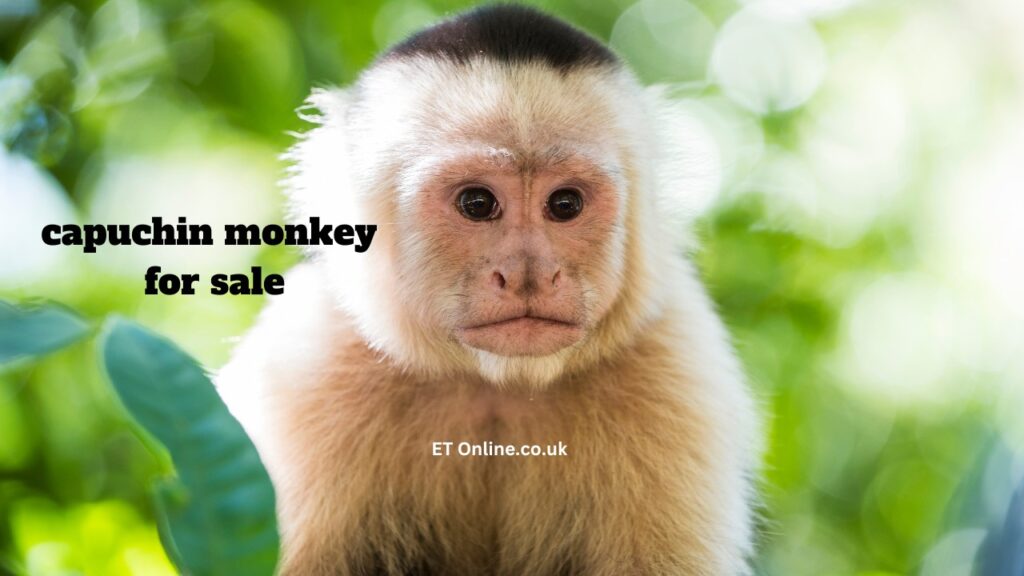Capuchin monkeys, known for their intelligence and charisma, have captured the hearts of many exotic pet enthusiasts. As one of the more popular primates, they often intrigue potential pet owners. However, the idea of finding a capuchin monkey for sale isn’t as simple as it seems. Capuchin monkeys, renowned for their intelligence and charming personalities, have become popular among exotic pet enthusiasts. These fascinating creatures can be a rewarding addition to the right home, but purchasing and caring for a capuchin monkey requires thorough consideration and preparation. This guide delves into the essentials of finding a capuchin monkey for sale, understanding their needs, and ensuring responsible ownership.
Table of Contents
ToggleUnderstanding Capuchin Monkeys
Physical Characteristics
Capuchin monkeys are small primates, with adult individuals typically weighing between 3 and 9 pounds. They are characterized by their prehensile tails, which aid in climbing and grasping, and their dexterous fingers, which are adapted for manipulation of objects. Their fur is a blend of black, white, and brown, and they are easily recognizable by the darker ‘cap’ of fur on their heads, reminiscent of the attire worn by Capuchin friars.
Behavior and Intelligence
Capuchin monkeys are highly intelligent and exhibit remarkable problem-solving skills. They are known to use tools, such as sticks to extract insects from crevices. In the wild, they live in complex social structures and communicate through a variety of vocalizations and facial expressions. Their social nature and advanced cognitive abilities make them both captivating and challenging pets.
The Ethics of Purchasing a Capuchin Monkey
Conservation Status
Although capuchin monkeys are not currently classified as endangered, they face threats from habitat destruction and illegal wildlife trade. The impact of these threats on their populations highlights the importance of sourcing capuchins ethically and ensuring that their acquisition does not contribute to environmental harm or illegal activities.
Captivity Concerns
Living in captivity presents significant challenges for capuchins, as replicating their natural habitat is difficult. These monkeys are highly social and thrive in dynamic environments. Potential owners must carefully consider whether they can meet the physical, social, and psychological needs of a capuchin monkey in a domestic setting.
Legal Considerations
Permits and Licenses
Ownership of capuchin monkeys is regulated by various laws and may require a permit or license depending on the jurisdiction. These regulations are designed to ensure both public safety and the well-being of the animals. Prospective owners should thoroughly research local and state regulations before making a purchase.
Animal Welfare Laws
Animal welfare laws vary widely, but they generally mandate humane treatment and adequate care for exotic animals. Understanding and adhering to these laws is crucial for providing a capuchin monkey with the appropriate care and ensuring legal compliance.
Preparing for a Capuchin Monkey
Home Environment
Creating a suitable environment for a capuchin monkey goes beyond basic needs. The living space should be spacious and include climbing structures, such as branches and ropes, to simulate their natural arboreal habitat. Environmental enrichment is essential to keep capuchins mentally stimulated and prevent boredom.
Cage Requirements
The cage for a capuchin monkey should be large and equipped with various interactive elements. It should include climbing apparatus, toys, and opportunities for foraging. A well-designed cage helps meet the monkey’s physical and mental needs, contributing to its overall well-being.
Enrichment Activities
Enrichment activities are vital for capuchin monkeys in captivity. These can include puzzle feeders, mirrors, and interactive toys that challenge their intelligence and mimic natural behaviors. Regular changes in enrichment activities can help prevent behavioral problems and promote mental health.
Daily Care and Diet
Feeding Requirements
Capuchin monkeys have a varied diet in the wild, consisting of fruits, insects, small animals, and vegetation. In captivity, they require a balanced diet that includes fresh fruits, vegetables, and specially formulated monkey pellets. This diet should be tailored to their specific nutritional needs to ensure optimal health.
Supplementation
To maintain proper nutrition, capuchin monkeys may need dietary supplements. Consulting with a veterinarian who specializes in exotic animals can help determine the appropriate supplements to ensure a balanced diet and prevent deficiencies.
Grooming Needs
Capuchin monkeys engage in mutual grooming in the wild, which serves both social and hygiene purposes. Regular grooming by their owner helps strengthen the bond between monkey and caregiver and ensures the animal’s coat remains clean and free from parasites.
Health Care for Capuchin Monkeys
Regular Vet Check-ups
Routine veterinary check-ups are essential for monitoring the health of capuchin monkeys. These visits should include vaccinations, parasite control, and dental care. Regular vet visits help detect health issues early and ensure the monkey remains in good condition.
Common Health Issues
Capuchin monkeys are prone to several health issues, including respiratory infections, diabetes, and dental problems. Early detection and prompt treatment are crucial for managing these conditions effectively and maintaining the monkey’s quality of life.
Training and Socialization
Basic Training
Training a capuchin monkey requires patience and consistency. Basic training can include teaching the monkey to respond to its name, follow commands, and perform simple tasks. Positive reinforcement techniques, such as rewards and praise, are effective in encouraging desired behaviors.
Social Interaction
Socialization is crucial for capuchin monkeys, as they are inherently social animals. Providing opportunities for interaction with other capuchins or humans helps prevent behavioral issues and fosters a well-adjusted and content pet. Regular social interaction can also enhance the monkey’s adaptability and overall happiness.
Challenges of Owning a Capuchin Monkey
Time Commitment
Owning a capuchin monkey demands a significant time commitment. These animals require daily interaction, mental stimulation, and physical care. Busy individuals may find it challenging to meet these needs, which can impact the monkey’s well-being.
Financial Responsibility
The financial costs of owning a capuchin monkey extend beyond the initial purchase price. Ongoing expenses include food, veterinary care, enrichment activities, and housing maintenance. Potential owners should be prepared for these costs and ensure they can afford the long-term commitment.
Finding a Capuchin Monkey for Sale
Reputable Breeders
Finding a reputable breeder is essential for ensuring the health and well-being of a capuchin monkey. A reputable breeder will provide detailed information about the monkey’s lineage, health history, and care requirements. They should also be transparent about the conditions in which the monkeys are raised.
Where to Find the Best Capuchin Monkeys for Sale in the USA:
- Wildlife Safari and Breeding Centers: These facilities often have high standards of care and breeding practices. Look for centers with positive reviews and affiliations with reputable organizations.
- Exotic Pet Breeders: Reputable exotic pet breeders specializing in capuchin monkeys can be found through online directories or through referrals from veterinary professionals. Ensure the breeder is licensed and adheres to ethical practices.
- Animal Sanctuaries and Rescues: Adopting from a sanctuary or rescue organization can be a fulfilling option. These organizations often have capuchin monkeys in need of homes and can provide support and guidance for new owners.
Questions to Ask a Breeder
When considering a breeder, ask the following questions:
- What is the monkey’s diet and socialization history?
- What veterinary care has the monkey received?
- What are the living conditions for the monkeys?
- How long has the breeder been in business, and what are their qualifications?
The Importance of Lifelong Commitment
Emotional Bonding
Capuchin Monkey For Sale, Capuchin monkeys form strong emotional bonds with their owners. This bond can be incredibly rewarding but also means that the monkey may experience stress or depression if rehomed. A lifelong commitment involves providing consistent care and attention throughout the monkey’s life.
Responsibility and Dedication
Owning a capuchin monkey requires dedication and responsibility. Prospective owners must be prepared to meet the monkey’s needs for a stable, loving environment and be ready to address the challenges that come with caring for such an intelligent and social animal.
Conclusion
Purchasing a Capuchin Monkey For Sale involves careful consideration of their needs, legal requirements, and ethical implications. With the right preparation and commitment, a capuchin monkey can be a fascinating and rewarding pet. However, potential owners must be aware of the responsibilities and challenges involved in providing a suitable and loving home for these remarkable creatures.
Also Read: Iredell Free News: All in One News Source For You
Frequently Asked Questions
Is it legal to own a capuchin monkey?
The legality of owning a capuchin monkey varies by country and state. It is essential to check local laws and regulations before purchasing a monkey to ensure compliance.
How much does a capuchin monkey cost?
The cost of a capuchin monkey can range from $5,000 to $7,000, depending on factors such as the breeder, the monkey’s age, and its lineage. Be prepared for additional costs related to care and maintenance.
What do capuchin monkeys eat?
In captivity, capuchin monkeys should be fed a balanced diet that includes fresh fruits, vegetables, and specially formulated monkey pellets. Their diet should be tailored to meet their nutritional needs.
How long do capuchin monkeys live?
Capuchin monkeys can live up to 25 years in captivity with proper care and nutrition.
Do capuchin monkeys make good pets?
Capuchin monkeys can be fascinating pets, but they require significant time, financial investment, and an understanding of their complex needs. They are best suited for owners who can provide the necessary care and attention.
Can capuchin monkeys be trained?
Yes, capuchin monkeys are highly intelligent and can be trained to perform various tasks and respond to commands. Training requires patience, consistency, and positive reinforcement.



